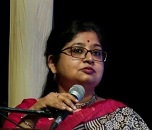
Dr. Amrita Panda
Founder & Managing Director, DeepRanjani Foundation, India
Title: Management of ASD: Celebrating and Empowering through the Uniqueness
Biography
Biography: Dr. Amrita Panda
Abstract
Autism Spectrum Disorder, as the name suggests, is characterised by a wide variability of symptoms and behavioral manifestations. Ranging from high functioning to mild autistic features, each individual comes with a unique set of characteristics. The traditional approach of management of ASD assumed a superiority of neurotypicals and intended to “fix” the individuals with ASD. With the sharp increase in the prevalence of ASD in newborns, along with the growing awareness of professionals and parents, it feels like there will be soon a world posing a big question on terms like neurotypicals and neurodiverse, redefining the concept of normality. With the shift of perception about ASD the management process has shaped up with a completely new look. The children with ASD are not “less”, they are “different”, and an effective management process starts with acceptance of the difference. Respecting them for who they are, instead of fixing them as per socio-cultural traditions. It’s more about what they want to do with their individual lives. The key focus of management remains communication, so that individuals with ASD can express their thoughts, choices and emotions. Instead of fixing, the management focuses more on empowerment and inclusion.
Classically use of special education methods, occupational therapy, speech and communication therapy has been used extensively as management modalities to teach new skills, developing emotional expression, communication and socialization abilities. In last decade creative art therapy has emerged as a very significant management tool to explore the solitude and self-absorption in ASD, enabling more modalities of expression. Along with creative art therapy, extensive play therapy, group therapy, hydrotherapy, adolescence training, focus on nutrition, physical exercise and weight management, vocational training, exploring employment opportunities have come up as very significant management platforms where individuals with ASD can find their own mind-body connect, can express themselves, can have meaning of life redefined through employment or meaningful involvements in adult life.
Management of ASD is a holistic approach. Training and sensitization programs for parents, siblings, family; forming support groups, stress-management circle groups are extremely important without which the entire work with the individuals with ASD goes in vein. Along with parents and family, training and upgradation of professionals associated with the special needs management group is also extremely important to maintain a global standard management protocol for individuals with ASD.
The talk intends to touch upon the different modalities of management of ASD in the new found light of celebrating uniqueness and empowerment.

